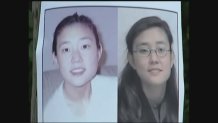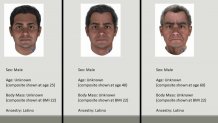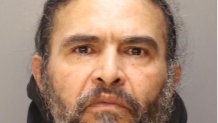The suspect in the Pennypack Park Trail slashings may be connected to a series of rapes and a murder in Philadelphia's Fairmount Park two decades ago, police said.
Elias Diaz, 46, was arrested Sunday after he allegedly slashed two people with a knife and threatened another person in separate incidents on the Pennypack Park Trail back in November.
On Tuesday, Philadelphia Police said Diaz may also be connected to the rapes of two women and the rape and murder of 30-year-old Rebecca Park in Fairmount Park in 2003. DNA evidence obtained from Diaz linked him to the 2003 attacks, though investigators are waiting for final confirmation, according to Interim Philadelphia Police Commissioner John Stanford.
Get top local stories in Philly delivered to you every morning. >Sign up for NBC Philadelphia's News Headlines newsletter.
“Everything we have at this point leads us to believe that Mr. Diaz is also involved, or a person of interest, regarding the murder of Rebecca Park which occurred in July of 2003, as well as possibly two or three other sexual assaults that occurred in Fairmount Park over a period of time," Stanford said during a Tuesday afternoon press conference.
Police said DNA evidence pointed to the same man being responsible for the Fairmount Park attacks but despite investigative efforts that have included money for information, he remained out of the grasp of authorities for years.
Local
Breaking news and the stories that matter to your neighborhood.
Who is the Fairmount Park rapist?
The moniker was assigned to a man linked by DNA evidence to three attacks in Fairmount Park and one in the Holmesburg section of Philadelphia.
He is suspected of three rapes – including one that resulted in the strangulation of a 30-year-old medical student – and a fourth attack at knifepoint in which his victim managed to escape.
When and where did the Fairmount Park rapist attack his victims?
The first attack dates back to April 30, 2003, when a 21-year-old woman jogging on Kelly Drive and Fountain Green Drive – an area adjacent to the Schuylkill River – was raped at knifepoint.
Then, on July 13 of the same year, 30-year-old medical student Rebecca Park was raped and strangled as she jogged along the 3500 block of Conshohocken Avenue, in the western side of the park. Her body was discovered four days later.

On Oct. 25, 2003, a 37-year-old woman was attacked at knifepoint as she jogged on West River Drive – since renamed to Martin Luther King Jr. Drive – near the Falls Bridge. She managed to escape and was driven by a passerby to a hospital in Lower Merion.
The three attacks happened within a one-mile radius of one another.
Police said the man struck again on Aug. 11, 2007, raping a woman in a park near Frankford and Solly avenues in the Holmesburg neighborhood.
What does the Fairmount Park rapist look like?
He is described as a man with a medium build standing 5-foot-8 with scars on his chest, shoulder and arm, possibly from burns or stab wounds, a dark complexion, black hair, thin mustache and bushy eyebrows. Police also said he spoke broken English.
During two of the attacks, the suspect wore an earring on his left ear and fled on a purple, metallic 10-speed bike, police said. During the attack in 2007, he wore a mesh sleeveless basketball shirt and shorts that were light blue with white stripes on the shorts and white edging on the shirt.
He also wore a gold chain with a crucifix pendant.
"We believe, as many serial offenders do, that this male may strike again, not a matter of if, but when and where. We want to make sure the public is armed with the proper tools to prevent that from happening,” Philadelphia Special Victims Unit Captain John Darby said in 2013, 10 years after the rapist's first attack.
Darby, who is now retired, spoke with NBC10 on Tuesday.
"Cases like this, they haunt you," Darby said. "We have a mantra in the special victims unit. I'm sure undoubtedly it's still there. And that is justice and healing for the victim."
How DNA led to a break in the Fairmount Park rape case
When the rapes and murder in Fairmount Park occurred in 2003, investigators began collecting DNA from the victims. DNA from all of the incidents were submitted to the Combined DNA Index System (CODIS) and linked to a single attacker.
"These cases were all matched together and we knew that we had a pattern," Interim Deputy Police Commissioner Frank Vanore said.
As technology evolved, so did the case. It began with a sketch that a victim helped police create and evolved to age progression photos of what the attacker would look like in his 20's, 40's and older.


"Uniformed officers. Investigators. The scientists coming together," Darby said. "Working as a team and ultimately that is what has gotten us here today."
Ultimately, the use of forensic genealogy linked the Fairmount Park attacks to Diaz, investigators said.
"Continued investigation into the family led to the tree being narrowed down to one particular branch of the tree within one family," Forensic Laboratory Manager Ryan Gallagher said. "Elias Diaz was identified as a potential person of interest."
Philadelphia District Attorney Larry Krasner credited technology with helping to make a major break in the cold case.
"Science outran this guy's bicycle," Krasner said. "Science got him. And that is a beautiful thing."
What we know about Elias Diaz

Court records obtained by NBC10 show Diaz had been arrested in Philadelphia in 2015 and faced charges related to "alcoholic beverages."
While investigators believe Diaz was living in the park "in the recent past," they're unsure where he resided over the past 20 years.
Krasner asked anyone who may have been victimized by Diaz to call 911, Women Organized Against Rape at 215-985-3333 or Woman Against Abuse at 215-686-7082.
"It is extremely important that we get justice for everyone who has been affected by such a predatory and such a concerning danger to the community," Krasner said.
Assistant District Attorney Joanne Pescatore also said her office anticipates charging Diaz with the rape and murder of Rebecca Park.
Resources for victims of sexual assault are available through the National Sexual Violence Resources Center and the National Sexual Assault Telephone Hotline at 800-656-4673.



